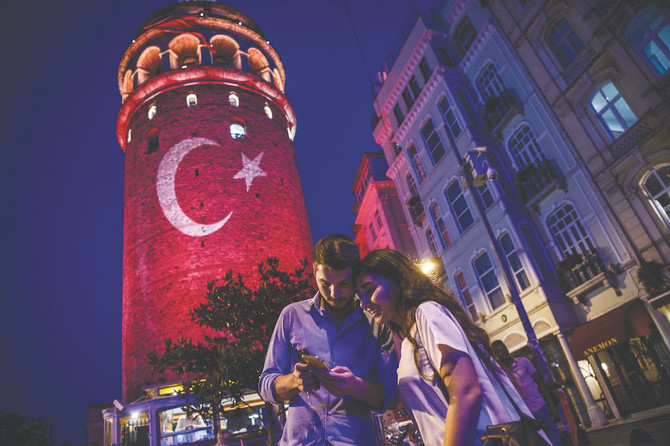ANKARA: Good and responsible journalism has become a highly depated issue in Turkey. When it comes to fake news, a significant number of Turkish people say they have already encountered it.
This year’s Reuters Digital News Report ranked Turkey first out of 37 countries in terms of exposure to fake news. Almost half of Turkish respondents — 49 percent — said they had read made-up stories in the week before the survey was conducted.
Turkey was followed by Malaysia, Greece, Mexico, Hungary, Romania and the Czech Republic, which scored 44, 44, 43, 42, 38 and 36 percent, respectively.
Exposure to fake news in the US stands at 31 percent, while the figure is lower in the UK at 15 percent, and in Western European countries such as Germany at 9 percent.
There are myriad examples of fake news in Turkey. In June, a video clip on social media in which a young person brutally cut a puppy’s feet was swiftly branded as a “Syrian refugee torturing an animal.” After being broadcast on many news sites and on social media, it triggered hate speech and xenophobia among many in Turkey.
The video was widely shared, reaching thousands of people. But it turned out that the video had been fabricated — and actually originated in Jordan, not Turkey.
According to the Reuters survey, many Turkish people believe fake stories are made up for political or commercial reasons.
The proportion who agree that the government should act more to separate fact from fiction on the Internet stands at 68 percent in Turkey, compared with 41 percent in the US and 59 percent in Germany.
To check the accuracy of the news, people often refer to Dogruluk Payi (Share of Accuracy) and Teyit.org, two Turkish nonprofit fact-checking organizations that were founded in 2014 and 2016, respectively. Their teams have examined hundreds of suspicious stories and photographs online.
Isinsu Acar, a university student in Istanbul, came across fake news this week when commuting, and said the documentary contained several unfounded arguments.
“To confirm that it was false, I used my logic and looked for inconsistencies,” she told Arab News. “Usually this step is enough to confirm. If it is not, I try to use reliable news sources. I use Dogruluk Payi to test whether news is true or not. I refer to the alternative media frequently.”
The rise of social media as a source of news in Turkey, where about 90 percent of the media is owned by pro-government business groups, also contributes to fake news consumption and can trigger social tensions and inflammatory rhetoric, experts have said.
News literacy in an area where technology facilitates the spreading of made-up stories is important in rising above fake news.
Servet Yanatma, an independent researcher and journalist who has contributed to the Reuters Institute’s Digital News Report, said all these figures revealed not only distrust in media content but also a high level of polarization.
“The respondents seem to be divided into two camps, either trusting or distrusting news media. People in either camp prefer to trust what they want to believe without questioning the accuracy of the news,” he told Arab News.
According to Yanatma, in Turkey — where media literacy is low — modern laws that address the challenges of online media, respect copyright and keep personal rights are necessary, along with some ways of solving the issue of deep polarization.
When Turkish participants in the Reuters survey were asked their main source of news in the past week, TV came first with 48 percent, followed by online, including social media, with 39 percent. The shares of radio (7 percent) and print media (6 percent) remain low.
“When the coverage of television and newspapers is largely controlled, their online content is controlled as well. The main question for me is how much the people access and use the ‘fake news.’ If a large part of traditional and online media is controlled in a country, people will inevitably expose its partisan coverage,” Yanatma said.
Why Turkey ranks first in the world in exposure to fake news
Why Turkey ranks first in the world in exposure to fake news











